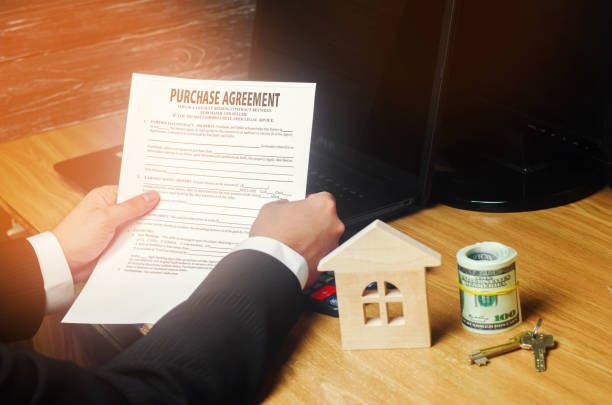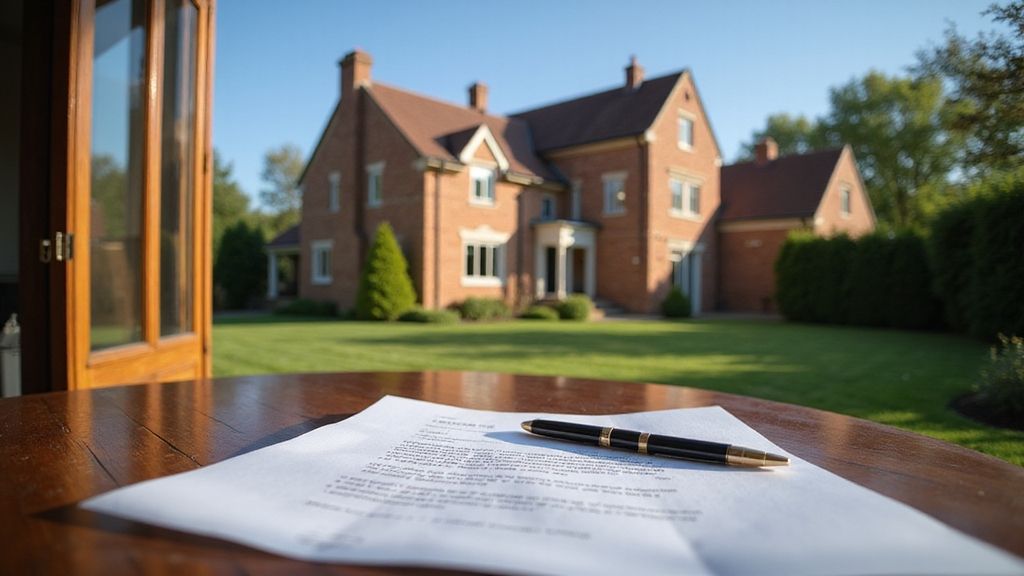Selling a House With Asbestos: What You Need to Know

Navigating the real estate market while selling a house with asbestos can be complex. The presence of asbestos can raise concerns for potential buyers due to the health risks associated with this once-common building material.
This comprehensive guide is designed to equip you with essential knowledge about asbestos, its implications for selling your property, and how to navigate the process while addressing potential buyer concerns.
Key Highlights
- Asbestos, commonly found in older homes, poses health risks if its fibers become airborne.
- When selling a house with asbestos, disclosure laws require informing potential buyers about its presence.
- Options for addressing asbestos include removal, encapsulation (sealing), or selling the house “as is.”
- Asbestos removal is typically costly, while encapsulation offers a less expensive alternative.
- Selling “as is” may lower the market value but appeals to buyers willing to handle the asbestos issue.
- Seeking guidance from real estate professionals specializing in properties with asbestos is recommended.
Understanding Asbestos in Homes

Asbestos, a naturally occurring fibrous mineral prized for its durability and fire-resistant properties, was commonly used in various building materials until the late 1970s. While useful, asbestos poses significant health risks when its fibers become airborne and are inhaled.
It’s important to note that asbestos-containing materials in good condition and left undisturbed typically pose minimal risk. The danger arises when these materials are damaged, deteriorate, or are disturbed during renovations, repairs, or demolition, potentially releasing hazardous asbestos fibers into the air.
The History and Use of Asbestos in Residential Properties
Asbestos was a staple in the construction industry for decades, particularly from the early 1900s to the late 1970s, due to its desirable properties such as fire resistance, insulation, and affordability. Its use wasn’t limited to a single building material but extended to various applications within residential properties.
Asbestos found its way into a wide range of building materials, including but not limited to, roofing shingles, siding, floor tiles, insulation around pipes and boilers, and even in decorative elements like textured paints and popcorn ceilings. Its prevalence during this era makes older homes particularly susceptible to containing asbestos.
Recognizing the potential health hazards associated with asbestos exposure, its use in new construction declined significantly by the 1980s.
However, its legacy remains in many older homes, requiring homeowners to be aware of its presence and take appropriate precautions when dealing with potential asbestos-containing materials.
Identifying Asbestos Materials in Your Home
Identifying asbestos materials in your home requires a cautious approach, as disturbing these materials can release harmful fibers. While some asbestos-containing materials might be visually identifiable, it’s highly recommended to hire a qualified professional for a thorough assessment.
A certified asbestos inspector can accurately identify asbestos materials, taking into account factors such as the age of your home, the types of building materials used, and their current condition. Common areas where asbestos materials might be present include insulation, floor tiles, ceiling tiles, roofing materials, and siding.
A professional home inspection, particularly one focusing on asbestos, provides valuable documentation about the presence and condition of asbestos materials. This report becomes crucial when preparing to sell your house, as it offers transparency to potential buyers and helps you comply with disclosure laws.
Health Risks Associated with Asbestos Exposure
The primary health concern associated with asbestos is the risk of inhaling airborne fibers, which can lead to severe respiratory illnesses. These microscopic fibers, when breathed in, can lodge themselves in the lungs, potentially causing long-term damage and increasing the risk of developing serious diseases.
Exposure to asbestos has been linked to several debilitating conditions, including asbestosis (a chronic lung disease), lung cancer, and mesothelioma (a rare and aggressive cancer affecting the lining of the lungs and other organs). The latency period for these diseases can be extensive, often taking decades for symptoms to manifest.
How Asbestos Poses a Danger to Homeowners and Residents
Asbestos exposure poses significant health risks, primarily affecting the respiratory system. Asbestos fibers, when inhaled, embed themselves in the lungs, leading to inflammation, scarring, and an increased risk of developing severe respiratory diseases.
One of the most significant health risks is lung cancer, a leading cause of cancer-related deaths globally. Prolonged exposure to asbestos fibers significantly increases the likelihood of developing lung cancer, particularly among smokers.
Another grave concern is mesothelioma, a rare and aggressive cancer directly linked to asbestos exposure. Mesothelioma affects the mesothelial cells lining the lungs, heart, and abdomen, and its symptoms often appear years after exposure, making early diagnosis challenging.
Legal Implications of Asbestos in Your Property
Owning a property with asbestos comes with potential legal implications, primarily regarding disclosure and handling of the material. The Environmental Protection Agency (EPA) and various state and local authorities have regulations in place to manage asbestos-related risks, including those associated with real estate transactions.
Failing to disclose the presence of asbestos during a property sale can have serious legal consequences, including lawsuits and financial liabilities.
Transparency about known asbestos issues is crucial to avoid potential disputes with buyers and legal repercussions.
Sellers have a responsibility to disclose any known asbestos issues, and buyers have the right to request asbestos inspections and negotiate remediation or price adjustments based on the findings. Engaging a qualified real estate attorney experienced in asbestos-related real estate matters can provide valuable legal protection.
Preparing to Sell a House Containing Asbestos
Selling a house containing asbestos requires careful preparation to address potential buyer concerns and ensure a smooth transaction. Begin by obtaining a professional asbestos inspection to accurately identify the presence and condition of any asbestos-containing materials in your home.
The inspection report will serve as a valuable tool for transparency and disclosure during the selling process. Based on the inspection findings, consider your options for addressing the asbestos, whether it’s removal, encapsulation, or selling the house “as is.”
Professional Asbestos Inspection and Testing
Before listing your house, it’s crucial to schedule a professional asbestos inspection and testing by a certified inspector. This step is vital in understanding the scope of asbestos presence in your property, which will be essential information during your real estate transaction.
The inspector will assess your property for potential asbestos-containing materials, collect samples, and send them to a certified laboratory for analysis. They’ll then provide a detailed report outlining the location, type, and condition of any asbestos found.
This report serves multiple purposes: it fulfills legal obligations related to disclosure in many states, informs potential buyers, and helps you make educated decisions about addressing the asbestos. Always verify your local regulations, as some areas might mandate asbestos testing before listing a property for sale.
Evaluating the Extent of Asbestos Contamination
Upon receiving your asbestos inspection report, carefully evaluate its findings to understand the extent of contamination in your house. The report should detail the location, type, and condition of asbestos-containing materials.
Pay particular attention to the condition assessment, as asbestos in good condition and undisturbed poses minimal risk. If the asbestos is damaged, deteriorating, or likely to be disturbed, it presents a higher risk of releasing hazardous fibers, necessitating action.
Consider the potential for future environmental hazards when evaluating the report. For example, materials in good condition might become a concern if you plan renovations before selling, as these activities could disturb the asbestos.
Options for Dealing with Asbestos Before Selling
Knowing your options for managing asbestos is crucial for a successful sale. After the inspection, you can choose from a few paths forward: complete asbestos removal, encapsulation, or selling your home “as is.”
Complete removal, although costly, provides peace of mind and removes the health risk entirely.
Encapsulation offers a more affordable alternative, sealing the asbestos to prevent fiber release. Selling “as is” appeals to investors or renovators who can factor the asbestos removal into their plans.
The Pros and Cons of Asbestos Removal vs. Management
Choosing between asbestos removal and management depends on your budget, the extent of contamination, and your preferred selling approach. Asbestos removal, while typically more expensive, offers a permanent solution.
Asbestos Removal:
- Pros: Eliminates health risks, increases property value, streamlines the selling process
- Cons: High remediation costs, time-consuming, potential for uncovering additional repairs
Managing asbestos in place, through encapsulation, is a less expensive alternative but doesn’t eliminate the root issue.
Asbestos Management:
- Pros: Lower cost than removal, faster process, minimizes disruption
- Cons: Asbestos remains, potential for future damage and exposure, may deter some buyers
Consulting with a qualified asbestos abatement contractor and an experienced real estate agent can help you determine the best course of action for your specific situation.
Estimating the Cost of Asbestos Abatement
Asbestos abatement costs can fluctuate significantly depending on several factors. The volume of asbestos-containing material, accessibility, removal method, and local labor rates all contribute to the final price.
While removing asbestos can be a substantial upfront investment, weigh it against the potential increase in market value and a smoother selling process. Some buyers may be hesitant to purchase a house with known asbestos, even with disclosure, leading to a lower price or a lengthier selling process.
Legal Requirements and Disclosure When Selling

Selling a house with asbestos comes with legal responsibilities. Transparency is paramount – you are legally obligated to disclose any known presence of asbestos to potential buyers. This disclosure protects you from future legal issues and empowers buyers to make informed decisions.
Disclosure laws vary by state, so consult with a local real estate agent or attorney to understand your specific obligations. In general, providing a copy of the asbestos inspection report to potential buyers is considered best practice.
State and Federal Asbestos Disclosure Laws for Sellers
Navigating asbestos disclosure laws can seem overwhelming, but understanding your legal responsibilities is crucial for a smooth sale. Federal regulations, primarily from the Environmental Protection Agency (EPA), don’t mandate homeowner disclosure during a sale.
However, the EPA does provide guidelines for managing asbestos in buildings.
State laws concerning asbestos disclosure vary significantly. Some states have stringent requirements, compelling sellers to disclose any known asbestos presence, while others offer more lenient guidelines.
Consulting with a knowledgeable real estate agent familiar with local disclosure laws is highly recommended. They can guide you through the intricacies of your state’s requirements, ensuring you meet your legal obligations and avoid potential complications during or after the sale.
How to Properly Disclose Asbestos to Potential Buyers
While disclosing the presence of asbestos is a legal obligation in many states, approaching it with transparency and professionalism can facilitate a smoother transaction. When disclosing asbestos to potential buyers, provide clear, concise information obtained from the professional asbestos inspection report.
Highlight the location, type, and condition of the asbestos-containing materials identified in the report. Offering reassurance is also essential, particularly if the asbestos is in good condition and poses minimal immediate risk. For example, you can emphasize that undisturbed asbestos is generally safe.
Maintain open communication with potential buyers and be prepared to answer any questions or concerns regarding the asbestos. Transparency and a willingness to address concerns proactively can build trust and potentially ease apprehension about purchasing a home with asbestos.
Conclusion
Selling a house with asbestos requires careful consideration of legal obligations and health risks. Understanding the history, identification, and implications of asbestos in your property is crucial. Whether opting for removal or management, disclosing asbestos to potential buyers is a must. Complying with state and federal laws ensures transparency and protects all parties involved.
By prioritizing professional inspection, evaluation, and disclosure, you can navigate the process with integrity and safeguard everyone’s well-being. If you’re selling a house with asbestos, stay informed, follow legal requirements, and prioritize safety for a smooth transaction.
Give us a call anytime at 484-484-0971 or fill out this quick form to get started today!
Get A Fair Cash Offer On Your House

About the author
Mathew Pezon
Mathew Pezon is the founder and CEO of Pezon Properties, a cash home buying company located in Lehigh Valley, Pennsylvania. With several years of experience in the real estate industry, Mathew has become a specialist in helping homeowners sell their properties quickly and efficiently. He takes pride in providing a hassle-free, transparent, and fair home buying experience to his clients. Mathew is also an active member of his local community and is passionate about giving back. Through his company, he has contributed to various charities and causes.















